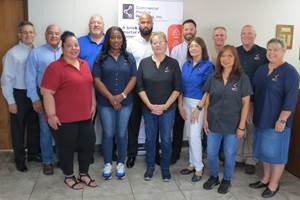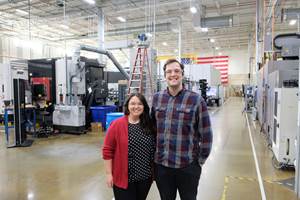Update on ‘Clean, Sustainable’ Carbon Black Production
Monolith Materials moves towards the potential reestablishment of North America as a leading carbon black producer.

Monolith Materials moves towards the potential reestablishment of North America as a leading carbon black producer.
In April 2015, we reported on Monolith Materials (formerly Boxer Industries) and how it aimed to shift the production of carbon black to be less reliant on the utilization of petroleum oil; first, in the domestic market and then globally.
Here is a progress update on the Redwood City, California firm, which believes that its proprietary process technology has the potential to reestablish North America as the leading global producer of carbon black. As previously reported, by 2012, North American carbon black capacity had dropped to a mere 12% of the global capacity, while China’s had risen to 38%.
Using natural gas as feedstock in its process instead of crude oil or coal-tar as in conventional processes, Monolith produces both standard ASTM grades of carbon black as well as highly customized performance grades for a broad range of applications. In plastics alone, these range from colorants in consumer and industrial goods to UV absorbers in pipe and agricultural films to electrically conductive grades used in electrical cables and various components of high-volume consumer electronics.
Since mid-2014, the company has been operating a pilot plant using its technology to convert pipeline grade natural gas using grid electricity into valuable carbon black and hydrogen. Located at its Redwood City site, the Seaport Plant serves as Monolith’s industrial demonstration facility and represents the first new carbon black plant to be permitted and built in the U.S. in the past 30 years, because of environmental regulations. On-site lab facilities also allow for grade evaluation and tuning, as well as ongoing applications development.
As noted above, a coproduct of Monolith’s manufacturing process is plentiful hydrogen. This valuable industrial gas is used in a range of industries including petroleum refining, clean-power generation, and chemicals. It was this that led to Monolith establishing what appears to be a first-of-its-kind partnership with the Nebraska Public Power District (NPPD), Nebraska’s largest electric utility. NPPD plans to replace an existing coal-fired boiler at its Sheldon Station plant in Hallam, Nebraska with one that will use hydrogen, produced by Monolith’s new full-scale carbon black manufacturing facility, to generate electricity.
In 2015, the company announced that it would build a world-scale carbon black production facility. Over the past 18 months, Monolith and NPPD finalized all necessary agreements for the first phase of the project. In addition, Monolith acquired control of approximately 180 acres of land adjacent to the Sheldon Station so NPPD can easily access the hydrogen. When burned, the hydrogen fuel produces zero greenhouse gas emissions. Through this collaborative project, NPPD is expected to reduce CO2 emissions at Sheldon Station by 1.1 million tons/yr. The new boiler, using hydrogen as a fuel, will continue to be capable of generating 125 megawatts of electricity for NPPD’s customers. The conversion is also expected to result in a dramatic reduction in other types of air emissions, and also aid in NPPD’s maintaining service as a low-cost energy producer.
Monolith has also completed a retain electricity agreement with the Norris Public Power District; secured firm natural gas transportation on the Northern Natural pipeline network; completed the first phase of rail design with Union Pacific; and in October of 2016, broke ground on the project. The first phase is expected to take 24-36 months to build and commission, and will support approximately 50 full-time operation jobs once complete.
Also over the last 18 months, the company has continued to operate its demonstration plant and has advanced its proprietary technology, while developing customers in the plastics, rubbers, and specialty markets. In addition, several key leaders have been added to the Monolith team to enable successful execution of their 911±¬ÁÏÍø plan. Jim Micali, former chairman and president of Michelin North America joined the board of directors of Monolith. Brian Allison (formerly Flint Hills, Dow and Cabot) and Jeffrey Lin (formerly Bridgestone and Momentive) joined Monolith executive team over the past year.

Related Content
NPE2024 Wrap-Up: Sustainability Dominates Show Floor News
Across all process types, sustainability was a big theme at NPE2024. But there was plenty to see in automation and artificial intelligence as well.
Read MoreInside the Florida Recycler Taking on NPE’s 100% Scrap Reuse Goal
Hundreds of tons of demonstration products will be created this week. Commercial Plastics Recycling is striving to recycle ALL of it.
Read MoreHow to Optimize Color Evaluation of Recycled Plastics
The right color measurement instrument and good working methods will minimize variability in color evaluation of PCR.
Read MoreScaling Up Sustainable Solutions for Fiber Reinforced Composite Materials
Oak Ridge National Laboratory's Sustainable Manufacturing Technologies Group helps industrial partners tackle the sustainability challenges presented by fiber-reinforced composite materials.
Read MoreRead Next
Making the Circular Economy a Reality
Driven by brand owner demands and new worldwide legislation, the entire supply chain is working toward the shift to circularity, with some evidence the circular economy has already begun.
Read MoreLead the Conversation, Change the Conversation
Coverage of single-use plastics can be both misleading and demoralizing. Here are 10 tips for changing the perception of the plastics industry at your company and in your community.
Read MoreFor PLASTICS' CEO Seaholm, NPE to Shine Light on Sustainability Successes
With advocacy, communication and sustainability as three main pillars, Seaholm leads a trade association to NPE that ‘is more active today than we have ever been.’
Read More














